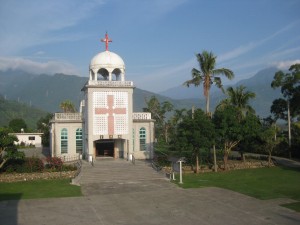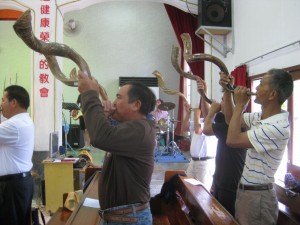On Easter Sunday April 5, 2015, the Presbyterian Church in Taiwan (PCT) will celebrate the 150th anniversary of modern Christian mission work in Taiwan. Soon after English Presbyterians arrived in the south (1865) and Canadian Presbyterian George Leslie Mackay arrived in the north (1872), they discovered Formosa’s aboriginal peoples and began to share the love and good news of Jesus Christ with them. During the 1920s-1950s many people from each aboriginal tribe became Christians. Today, 515 of the 1254 churches in the PCT are indigenous (40% of the PCT), while 11 of the PCT’s 23 presbyteries are indigenous. (2-3% of Taiwan’s total population is indigenous, about the same percentage as First Nations people in Canada.)
Over the past 60 years the PCT and the Bible Society in Taiwan (BST) have helped indigenous peoples make the transition from oral-only to both oral and written cultures. In the face of dominant outside languages (Japanese then Mandarin Chinese), the PCT and BST have worked together with indigenous peoples to preserve and promote the use of their ancestral languages. One way churches try to keep their mother tongues and cultures is by encouraging everyone to read and study the Scriptures in their own language. This foundational mission work is strongly supported by the PCT, the BST and our own PCC. The New Testament has already been translated into eight different indigenous languages; some groups also have portions of the Old Testament, and two have complete Bibles.
It is a real joy for me to serve as a Bible Translation Adviser with indigenous pastors and elders who are translating the Bible into Amis, Bunun, Drekay and Paiwan. In 2014, I met with these four teams for 1-2 weeks each during each of my three trips to Taiwan: Feb 7 – Mar 24, May 23 – July 5 and Oct 15 – Nov 29 (about 19 weeks in total). When I am home in Toronto, I use specialized Bible translation software called Paratext to review each team’s ongoing work and flag items that may need our further attention. The teams appreciate my questions or suggestions on how we might improve the quality and accuracy of their translations.
Early in 2014, the Drekay and Paiwan teams and I finalized their respective translations of the Book of Ruth. In April the BST issued copies of Ruth in both languages at the PCT’s General Assembly. The 17 Drekay churches and 90 Paiwan churches have enjoyed reading and studying Ruth and are eager for the publication of more Old Testament books.
To celebrate the PCT’s 150th anniversary, the BST asked all four teams to translate the Book of Proverbs. The teams and I had a lot of fun reviewing and improving their translations of this wonderful book of wise sayings and practical teaching. Verses that mention hunting (e.g. Pro 12:12, 27) took on fresh meaning as team members shared stories from their childhood about accompanying father or grandfather in pursuit of wild mountain boar. A verse which mentions mortar and pestle (Pro 27:22), difficult to appreciate in a Canadian context, paints a vivid picture of traditional tools that Taiwan’s indigenous peoples still use to grind millet, a staple food in their diets.
While working through the Book of Proverbs with each team, I noted verses in a Mandarin Bible that we use (Today’s Chinese Version or TCV) which could be improved. As it happens, in April 2015 Mandarin speaking members of the United Bible Societies will consider starting an official revision of TCV. I hope my suggestions for Proverbs and other books in the future can be a small help for that project too. A newly revised TCV would benefit all our indigenous translation projects in Taiwan plus translation projects for minority language groups in China too.
In addition to finishing Ruth and Proverbs, I helped each team improve their ongoing translations in other ways. The Amis team and I updated the spelling system for the Revised Amis New Testament, Psalms and Proverbs. We also improved consistency for the spelling of proper names and for translations of important theological terms, e.g. ‘Lord Jesus’, ‘Lord Jesus Christ’, ‘Spirit of God’ and ‘Holy Spirit’. We hope this revised Amis version will be finished by 2017.
The Bunun team and I completed our review of Genesis 25-50. Consensus is growing on basic issues such as how to spell certain sounds and whether to join morphemes or divide them with spaces (similar to ‘talking’ versus ‘tawk ing’). Everyone is eager to see Proverbs published in April 2015. This will be a good test for the current Bunun writing system too. We plan to review Exodus next. We pray for 75-year-old lead translator Rev Manias Chang Yu-fa who had cancer therapy in the fall.
The Drekay team and I also reviewed the Book of Malachi. The team wants to tackle the rest of the 12 Minor Prophets next, in order to build momentum for reviewing longer books in the Old Testament. We pray for one of our lead translators Rev Adriu Lai who had a serious stroke in May 2014 and has still not recovered.
The Paiwan team and I also reviewed chapters in Deuteronomy, 2 Samuel and 2 Kings. Paiwan churches have accepted a few new spelling rules and the translation ‘MALAILAING’ for ‘YHWH/the LORD’ which we introduced in Ruth. We pray for God to comfort and encourage Rev Kualj, a lead translator, whose beloved wife Ywe-cho died in December after a year-long struggle with cancer.
As my mission work over the past 2-3 years has shifted from Hakka to indigenous Bible translation, I have had more invitations to visit indigenous churches. When asked to preach, I speak in Mandarin Chinese which is then translated into the local aboriginal language. In 2014 I preached at the large Amis Falangaw PC in Taitung plus one of the oldest Paiwan churches in the village of Chia-yi. In February I attended a beautiful induction service and traditional Paiwan banquet at Ma-er PC for Rev Tjukar, an old friend and key leader on the Paiwan Bible translation team. I also enjoyed warm fellowship and lively worship at Pan-shr PC (Drekay), Gwang-fu PC (Amis) and Sui-men PC (Paiwan).
- Amis Fata’an PC in Gwang-fu
- Worship at Fata’an PC in Gwang-fu
I continue to promote the Hakka Bible (published in 2012) whenever opportunities arise. In 2014 I preached at Sung-lien PC’s Hakka fellowship in Taipei and visited PCT Hakka churches and friends in Chuk-thien, Nui-phu and Sin-tiam. In October I was a guest speaker at an excellent day-long Hakka mission event held at He-ping PC in Taipei. I discovered that 50 people in this large urban congregation are either Hakka or have strong Hakka connections. They hope to start a weekly Hakka fellowship on Saturdays similar to the one at Sung-lien PC. During a visit to Tainan, a PhD student interviewed me and my Hakka co-worker Rev Chen Chhong-fat at length for her thesis on the Hakka Bible and its relation to Hakka language and culture. A few days later her thesis director added a Hakka Bible to a prominent display in the National Museum of Taiwan Literature in downtown Tainan. In December the PCT’s weekly Church Press newspaper published an interview with me promoting the Hakka Bible (Issue #3276, Dec 8-12, 2014, http://weekly-pctpress.org/2014/3276/3276_05.pdf). May God’s Word and Spirit lead many to a living faith in Jesus Christ.
For other PCT news in 2014, you can browse headlines and articles on the English page of the PCT Church Press website at: http://enews-pctpress.org/home/index.php.
I praise God for daily grace and mercy, and I thank the PCC, the PCT and the BST for supporting this multicultural multilingual mission work. I am ever grateful for the prayers and offerings which enable me to share my experience in Bible translation with our partners in Taiwan. Sincere thanks to all the congregations in the PCC, plus groups in the Atlantic Mission Society and the Women’s Missionary Society, who faithfully support Bible translation through Presbyterians Sharing. May God bless you for the role you play in sharing the Gospel of Jesus Christ through the Hakka Bible and ongoing translation work among Taiwan’s indigenous peoples.
Proverbs 9:10
“The fear of the LORD is the beginning of wisdom,
and the knowledge of the Holy One is insight.” (NRSV)
“O tatapangan no sakacitaneng ko nika ngodo to TAPANG,
o mafana’ay to safangcalay a Kawas i, o citanengay.” (Amis)
“Maaz a sapising mas Sasbinazdihanin hai kitngaab tu na mintaiklas;
maaz a sahaal mas Mastaan Masaningsing cia hai ishansaipan.” (Bunun)
“Ku mwasakene mukuludru ki TAMATAMA yai sapathagili ki thingalane;
ku wathingale ki Sanianiangenga amani ku ngiathingale.” (Drekay)
“Aicu a paqaljaiyan tua MALAILAING mavan a kasizuan nua puvarungan;
a na kemljang tua Tjalja Paravacan a CEMAS na pulingalingaw a paqulidj.” (Paiwan)
“Kin-vi Song-chú he chṳ-fi ke khôi-thèu;
ngin-sṳt Chṳ-sṳn-chá chhiu-he chhûng-mìn.” (Hakka)
敬畏上主是智慧的開端;
認識至聖者就是明智。(TCV)










